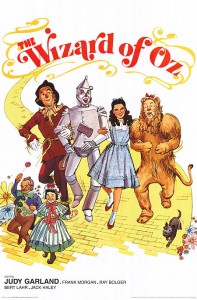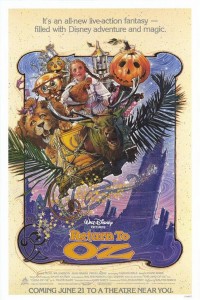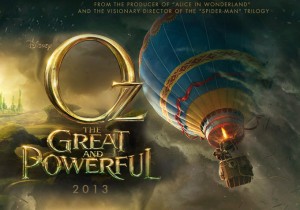 In 1900 the first of L. Frank Baum’s “canonical” children’s novels set in the fantasy world of Oz debuted: The Wonderful Wizard of Oz. Since that time the world has been fascinated and intimidated by the Emerald City, the Yellow Brick Road, and the ruby slippers; fascinated because Baum introduced a landscape that grew and became more complex throughout the series, often reemerging in other efforts by him (although not directly connected) as well as by others. There have been numerous attempts on the part of Hollywood to visit Oz on a semi-regular basis, and aside from the classic 1939 film starring Judy Garland, nearly all of them have stumbled with public acceptance.
In 1900 the first of L. Frank Baum’s “canonical” children’s novels set in the fantasy world of Oz debuted: The Wonderful Wizard of Oz. Since that time the world has been fascinated and intimidated by the Emerald City, the Yellow Brick Road, and the ruby slippers; fascinated because Baum introduced a landscape that grew and became more complex throughout the series, often reemerging in other efforts by him (although not directly connected) as well as by others. There have been numerous attempts on the part of Hollywood to visit Oz on a semi-regular basis, and aside from the classic 1939 film starring Judy Garland, nearly all of them have stumbled with public acceptance.
Oz seemingly is the father of several fantasy lands that have not been fully explored by the media, with the trials of the Chronicles of Narnia, written by C.S. Lewis, being the most direct example with a dash of eschatology thrown in. It is a hugely vexing thing that there are these multi-volume series out there, ostensibly devoted to the childrens’ market, and yet they seem so unsuccessfully unadaptable to longterm franchise goals. The Wizard of Oz gets a second chance at the big screen this weekend with Sam Raimi’s all-star spectacle Oz The Great and Powerful, a prequel to the story we know, which casts such a long shadow it blots out most of the efforts to capitalize on the property.
Only two have succeeded. One is the believed impetus for the new Oz movie, the novel Wicked: The Life and Times of the Wicked Witch of the West by Gregory Maguire. The story itself acts as prequel, telling the tale of Elphaba, who would become the green-skinned Wicked Witch of the west and Glinda, her sister. The story has Baum’s trappings and some of the characters but is not a part of his creation, as this was most certainly a novel for adults with its sympathies focused on the shunned, different sister and how the world influenced her ultimately choosing evil. The name “Elphaba” itself is a nod to Baum, as it is a sort of portmanteau based on his initials L. F. B. The long-running Broadway musical based on the book, Wicked, broke what had seemed for the longest time a binding spell. Attempts to get an Oz-based property into a theatrical setting, film or stage, had all met with degrees of failure. It helped that Wicked was itself a musical, but films, TV miniseres, and other attempts to relaunch the original book series into modernity all flopped.
 One such effort was Return To Oz, 1985 Disney release directed by frequent George Lucas collaborator Walter Murch. Alongside a high-profile cast, Dorothy Gale was played by a young Fairuza Balk (later achieving a bit of success in the teenage witch flick The Craft). Unlike the MGM musical with its candy-coated, 3-strip Technicolor trappings, Return To Oz reflected a slightly grittier Oz, less magical, more menacing, and the critics made no bones about talking up the distinctions. Although the film has later achieved a small cult following, it is typical of the modernist approach that has plagued all these editions. That is, Oz is regularly used as the metaphoric “running away into fantasy to escape the problems of reality.” The upshot of this is always that the golden road is never the solution and that “there’s no place like home.” One could imagine that in the mid-1980s, with the fever blister of the Cold War, and the nuclear threat about to pop it, this was seen as the perfect venue for escapism.
One such effort was Return To Oz, 1985 Disney release directed by frequent George Lucas collaborator Walter Murch. Alongside a high-profile cast, Dorothy Gale was played by a young Fairuza Balk (later achieving a bit of success in the teenage witch flick The Craft). Unlike the MGM musical with its candy-coated, 3-strip Technicolor trappings, Return To Oz reflected a slightly grittier Oz, less magical, more menacing, and the critics made no bones about talking up the distinctions. Although the film has later achieved a small cult following, it is typical of the modernist approach that has plagued all these editions. That is, Oz is regularly used as the metaphoric “running away into fantasy to escape the problems of reality.” The upshot of this is always that the golden road is never the solution and that “there’s no place like home.” One could imagine that in the mid-1980s, with the fever blister of the Cold War, and the nuclear threat about to pop it, this was seen as the perfect venue for escapism.
The initial rejection, I believe, was not due to the darkness/lightness factor, as youth-oriented movies had been swaying toward the dark side since 1979. Return To Oz was just applying the makeup of the times. The real difficulty was that Oz itself seemed quaint. For decades, particularly before home video, The Wizard of Oz was a holiday institution which would run on CBS yearly. It would pull sizable audiences each time. It was a “sure thing,” in that regard. But it was a movie from the ’30s based on a turn-of-the-century book, and this was intrinsic to an otherworldliness found in the film. It said much about another world to kids watching in the 1970s, and that other world was America itself, not the fiction over the rainbow. If you have grown up with those expectations, anything new applying those icons is liable to arrive predated in one’s mind.
 We tend to use those icons liberally to get a point across, and it works extremely well because everyone knows the Wizard. When Elton John sang Bernie Taupin’s words about rejecting “the yellow brick road,” this was about rejecting the fast-track to fame, where everyone seems to be your friend and has their hands down your trousers. The song was seen as a rejection of phonies, a figurative “I’m going back to my plow,” as Taupin was a farmer’s son. Beyond that title line, the song has nothing to do with the story, yet it conveys everything in an instant. When one speaks of “seeing the man behind the curtain,” or unveiling the deception of power to find a not-as-bright engineer, we get that from The Wizard. Knicking a term director Alfred Hitchcock used, The Wizard is the ultimate macguffin, the goal of the quest, the maker of tasks, and in the end arriving somewhat past the point. He projects authority, and is revealed to be anything but.
We tend to use those icons liberally to get a point across, and it works extremely well because everyone knows the Wizard. When Elton John sang Bernie Taupin’s words about rejecting “the yellow brick road,” this was about rejecting the fast-track to fame, where everyone seems to be your friend and has their hands down your trousers. The song was seen as a rejection of phonies, a figurative “I’m going back to my plow,” as Taupin was a farmer’s son. Beyond that title line, the song has nothing to do with the story, yet it conveys everything in an instant. When one speaks of “seeing the man behind the curtain,” or unveiling the deception of power to find a not-as-bright engineer, we get that from The Wizard. Knicking a term director Alfred Hitchcock used, The Wizard is the ultimate macguffin, the goal of the quest, the maker of tasks, and in the end arriving somewhat past the point. He projects authority, and is revealed to be anything but.
But the fascination persists, from Tom and Jerry meet the Wizard of Oz, to a Robert Halmi TV miniseries, to the Baum biography starring John Ritter as the writer. Something was tapped into back during Baum’s day that has yet to be fully understood, if not explored. I think I know what that is. Again recalling the Pevensie children from C.S. Lewis’ series, or the kids caught beyond the tesseract in Madeleine L’Engle’s A Wrinkle In Time and subsequent novels, there is something attractive and comforting about stories where children conquer foes at unspeakable odds. It is measurable against the things adults must fight through the course of their lives. Even in the midst of financial burden, of crisis, of medical failures from small wounds to great cancers, those kids overcame. Maybe I can too. That was the point of many of these books. Certainly this was the case with Narnia with the children’s story wedged smack between the two great wars. The film adaptation of The Wizard of Oz came after the Great Depression and before WWII, so the illusion of escaping from poverty and bloodshed into this separate universe, flying monkeys and all, might be an unavoidable temptation, or a fictitious coping mechanism.
 That also leads to the quaintness of the book because, now, our proxies for wars are other wars…with robots, underworld creatures, vampires, werewolves, or the living dead, but we’ve crossed the line where we trade combat for the fantastic with where we trade combat with combat.
That also leads to the quaintness of the book because, now, our proxies for wars are other wars…with robots, underworld creatures, vampires, werewolves, or the living dead, but we’ve crossed the line where we trade combat for the fantastic with where we trade combat with combat.
Is the world ready for another take on Oz? I guess that will depend on Sam Raimi. He is a director with unique, chaotic vision who can wring comedy from horrors, pathos from absurdities like a man-insect hybrid, and actually has a handle on what makes a drama work. He is also prone to letting his talents go too far, to be swallowed up by what he could do versus what he should do. He is, in that way, in lock step with Tim Burton who, while being the most appropriate director to revisit Alice In Wonderland, was also the least disciplined choice. Alice wound up being a visual marvel, but also ugly and hard to watch over time. There is a high possibility that Raimi’s depiction of the Wizard (as portrayed by his “Harry Osborne,” James Franco) will walk that thin line appropriately. There’s also the chance that it could go straight off the rails into self-parody and indulgences.
Wicked may have instigated the possibility of functional Oz prequel, but the fact that such a big production as Oz The Great and Powerful is being put out not in the prime seasons of Summer or Christmas but in the doldrums of the late Winter regularly counts as a vote of no-confidence from the studios. They may be expecting the same as they got from last weekend’s fairytale rehab, Jack The Giant Slayer; being a feeble #1 at a depressed box office tally. You can still honestly say you were number one for the weekend, so long as you omit the details of a bored shrug from the moviegoing majority.
Suffice it to say that, no matter how the movie fares, the world of Oz will remain imprinted on our collective psyche for decades to come. It is one of the very few things left in common with previous generations and likely one of the few we can confidently share with the future.









Comments